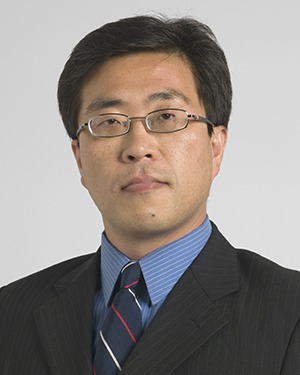Research News
01/14/2019
NCI-Funded Study Aims to Enhance Glioblastoma Treatment
The five-year, $2.4 million grant from the National Cancer Institute was awarded to Jeongwu Lee, PhD, Department of Cancer Biology.

Jeongwu Lee, PhD, Department of Cancer Biology, was awarded a five-year, $2.4 million grant from the National Cancer Institute, part of the National Institutes of Health, to study an FDA-approved drug to enhance treatment of glioblastoma (GBM), the most common and lethal form of brain cancer.
Dr. Lee and his team previously discovered that a dopamine receptor in the brain called DRD2 (dopamine receptor subtype 2) promotes the survival and growth of GBM cells, suggesting that it may be a good target for future pharmacological interventions. When DRD2 is “turned on,” it signals a chain of reactions that ultimately activates another receptor called c-MET (tyrosine-protein kinase Met). C-MET is known to regulate a dangerous subset of cancer cells called cancer stem cells and promote GBM therapeutic resistance.
The new grant will allow Dr. Lee to build on pre-clinical research related to ONC 201 (a recently developed DRD2 antagonist) and repurpose perphenazine, a clinically used anti-psychotic drug, as an anti-GBM treatment to determine if it can ultimately slow the growth and impede tumor recurrence. In additional to studying the cellular mechanisms at play, the team will look to preclinical models bearing patient-derived GBM tumors to better understand the effects of inhibiting DRD2 activity.
GBM tumors are extremely variable (on both genetic and cellular levels) from patient to patient, and it is particularly hard to deliver drugs into tumors due to the blood-brain-barrier (BBB). Dr. Lee is hopeful that this intervention will prove successful because early findings suggest the DRD2 inhibitor can in fact cross the BBB.
Featured Experts
News Category
Related News
Research areas
Want To Support Ground-Breaking Research at Cleveland Clinic?
Discover how you can help Cleveland Clinic save lives and continue to lead the transformation of healthcare.
Give to Cleveland Clinic